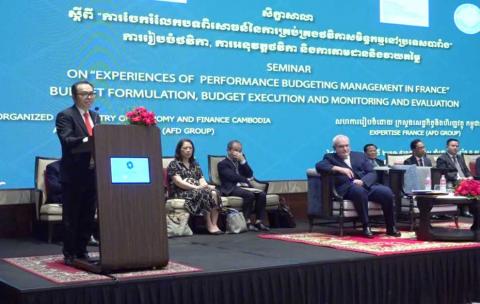
A vendor pulls his cart past the Ministry of Economy and Finance in the capital’s Daun Penh district in July. Heng Chivoan
Cambodia's Budgetary Central Government (BCG) collected domestic revenues amounting to over $5.3 billion during the first 11 months of 2023, representing over 84% of the 2023 annual budget law (BL), slightly lower than the same period in 2022, according to the Ministry of Economy and Finance.
The BCG collected 21.824 trillion riel (approximately $5.365 billion) in domestic revenue during the January-November period, according to the ministry’s state budget execution report.
The value equates to 84.27% of the 2023 BL, marking a 2.15% decrease compared to the same period last year.
The total includes 19.627 trillion riel ($4.825 billion) in tax revenue, accounting for 83.8% of the BL and representing a 4.48% decrease.
Non-tax revenue amounted to 2.163 trillion riel ($531.8 million), surpassing the BL by 100.95% and contributing to a 26.11% increase.
“Based on the trend of revenue performance over the last several years, combined with the recovery of Cambodia’s socio-economic activities, revenue collection is on track according to the 2023 BL,” stated the report.
BCG’s spending reached 27.601 trillion riel ($6.786 billion), equivalent to 79.44% of the 2023 BL, marking a 16.29% increase compared to the same interval of 2022.
Outlays comprised 9.396 trillion riel ($2.310 billion) in current expenditure, up by 10.18%, and 18.204 trillion riel ($4.476 billion) in capital expenditure, an increase of 19.71%.
According to the report, the authority continues to focus on restricting unnecessary spending while allocating budgets to proactive objectives.
“The government continues to manage and utilise BCG’s total financing effectively and carefully, which has enabled timely budget execution. Foreign financing achieved 5.206 trillion riel ($1.28 billion), equivalent to 81.24% of the 2023 BL and domestic financing reached 4.390 trillion riel ($1.079 billion), equivalent to 56.79% of the BL. The government’s net deposits stood at 79 billion riel ($19.42 million),” it stated.
Hong Vanak, director of International Economics at the Royal Academy of Cambodia, noted that achieving revenue-expenditure alignment with the annual BL is positive, highlighting effective law enforcement and cash flow management.
He noted that the slight revenue decline is not unusual in the context of ongoing global economic challenges.
“When the global economy improves, there will undoubtedly be an increase in both people and goods traffic, leading to a rise in tax revenue,” he said.
The International Monetary Fund (IMF) forecasted in October that Cambodia’s economic growth would reach 5.6% in 2023 and 6.1% in 2024.
The forecast is marginally higher than the World Bank’s forecast, which projected Cambodia’s economy to grow at 5.5% in 2023 and 6.1% in 2024.
The finance ministry projects that the country’s economy will grow by approximately 6.6% in 2024, bringing the gross domestic product (GDP) to around 142.96 trillion riel ($35.15 billion).
The Kingdom’s international reserves are expected to increase to $21.28 billion in 2024, up from an estimated $19.44 billion in 2023 and $17.8 billion in 2022, as reported by the ministry.



























